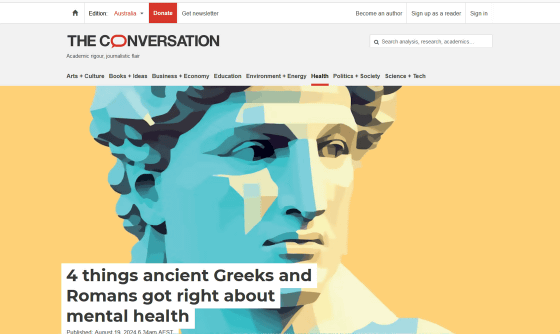What did the ancient Greeks and Romans think about 'mental health'?

According to the World Health Organization (WHO),
4 things ancient Greeks and Romans got right about mental health
https://theconversation.com/4-things-ancient-greeks-and-romans-got-right-about-mental-health-232824

◆1: Your state of mind is important
Mental health issues such as depression were familiar to ancient people as well. Homer , the 8th century BC poet who left behind works such as the Iliad and the Odyssey , is said to have died from a weakened state caused by depression .
Ancient Greek physicians recognized that people's health depended in part on the state of their minds as early as the early 5th century BCE. In the medical text ' Epidemics ,' supposedly collected by Hippocrates around 400 BCE, an anonymous physician wrote that people's lifestyle, clothing, housing, physical activity, and sex, all of which are related to their thinking, were the main determinants of their health.

2. Mental health issues can lead to illness
An anonymous doctor writing in Epidemics described one patient whose mental health deteriorated, becoming confused and eventually unable to speak. The patient remained in bed for 14 days before recovering, but it's unclear what kind of treatment he received.
Later, the physician
Galen also describes a patient whose mental health deteriorated and who eventually died: he lost money, his mind deteriorated, he spent a long time in an agitated state of alternating regret and grief, he fell ill with fever, became delirious, and died.

◆3: Mental illnesses are preventable and treatable
People in the ancient world also had ideas about how to prevent or treat mental illness. For example, the 5th century BC philosopher
In addition, ancient physicians had their own approaches to dealing with mental health issues, and many of them recommended lifestyle changes, such as 'introducing new exercise methods,' 'adopting a diet that includes mild wines and fruits,' 'traveling by sea,' 'listening to lectures by philosophers,' 'playing games such as checkers ,' and 'taking on modern-day brain teasers like crossword puzzles and Sudoku.'
Other physicians, such as Galen, believed that mental problems were caused by 'some thoughts which seized the mind' and could be cured by removing these thoughts. Galen's treatment involved distracting the mind from the thoughts that were causing the mental illness by replacing aggravating thoughts such as 'grief over the loss of money, political intrigue, or the danger of being poisoned' with 'resentment at injustice, love of competition, the desire to outdo others for profit.'

◆4: Addressing mental health needs
Many ancient peoples believed that maintaining a healthy mental state required effort, and that to move away from feelings of anxiety, anger, or depression, one should engage in activities that elicit the opposite emotions. For example, the 5th-century physician Caelius Aurelianus argued that people suffering from depression should engage in activities that make them laugh and feel happy, such as going to the theater to see a comedy.
However, the ancients did not believe that a single activity was enough to improve their mental state, but rather believed that the important thing was to make major changes in the way we live and think. 'When it comes to mental health issues, we clearly have a lot in common with our ancient ancestors. A lot of what they said 2,000 years ago seems just as relevant today, even though we use different methods and medications today,' Panegires said.

Related Posts:
in Note, Posted by log1h_ik







